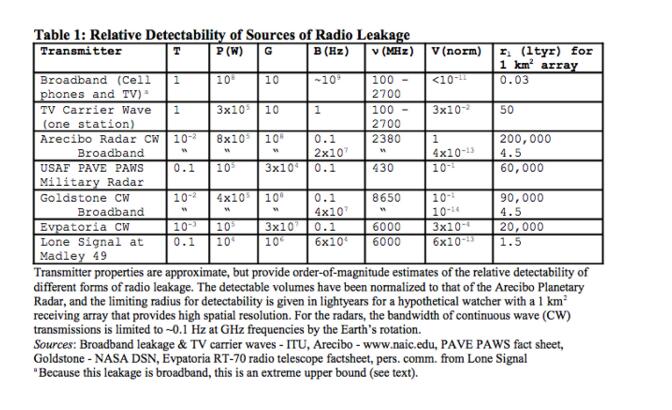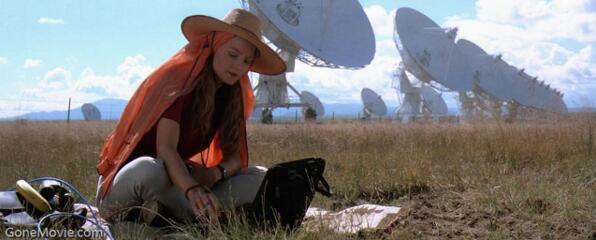 向太空发射电磁波信号会危及我们自身吗
向太空发射电磁波信号会危及我们自身吗
Are We Screwing Ourselves By Transmitting Radio Signals Into Space?
译文简介
加拿大未来学家、科学作家和伦理学家乔治·德沃尔斯基(George Dvorsky)撰写并广泛讨论了尖端科学和技术的影响。且看他又胡说些什么。
正文翻译
Are We Screwing Ourselves By Transmitting Radio Signals Into Space?
向太空发射电磁波信号会危及我们自身吗
向太空发射电磁波信号会危及我们自身吗

For nearly a hundred years, Earth has sent radio signals into space. If anyone nearby is listening, they probably know we’re here. In light of this, a new paper assesses the potential danger presented by such signals, concluding that the benefits outweigh the risks. But how can we really know?
Top image: Scene from Battleship (2012), a film in which an alien civilization discovers Earth by detecting its radio emissions.
近一百年来,地球一直向太空发送电磁波信号。 如果附近有什么东西在听,对方就有可能知道我们在哪。 有鉴于此,一篇新论文评估了此类电磁波信号的潜在后果,得出的结论是收益大于风险。 但我们怎么才能真正判断这一点?
上图:《超级战舰》中的场景(2012 年),这是一部讲述外星文明通过探测电磁波发现地球的电影。
Leaky Earth?
四面漏风的地球?
四面漏风的地球?
We’ve been shouting out into the cosmos for quite some time now. Electromagnetic waves of various intensities and frequencies have been streaming away from Earth for well over a century, the remnants of TV broadcasts, mobile phone conversations, satellite transmissions, and military, civil and astronomical radars.
很长一段时间以来,我们一直在向宇宙呐喊。 一个多世纪以来,不同强度和频率的电磁波不停从地球射出,通常源于电视广播、手机通话、卫星传输以及军用、民用和天文雷达的余波。
很长一段时间以来,我们一直在向宇宙呐喊。 一个多世纪以来,不同强度和频率的电磁波不停从地球射出,通常源于电视广播、手机通话、卫星传输以及军用、民用和天文雷达的余波。
We’ve even deliberately tried to get ET’s attention — a controversial practice known as METI (Messaging to Extraterrestrial Intelligences). There have been many such attempts, including the 2001 Teen-Age Message to the Stars organized by the Russian cosmologist Alexander Zaitsev. His work, and those of others, have been criticized as being insanely risky given the dearth of information we have about the nature of ETIs. Two years ago, John Billingham and James Benford called for a global moratorium on METI, an initiative similar to the one David Brin and myself worked on last decade.
人类甚至故意尝试吸引地外智能——即被称为 METI(向地外智能传递信息)的项目。 已经有很多这样的尝试,比如2001年由俄罗斯宇宙学家Alexander Zaitsev组织的Teen-Age Message to the Stars项目(向星空广播青少年的信息)。 鉴于我们对地外智能的性质知之甚少,他和其他人的所作所为被批评为风险极大。 两年前,约翰·比林厄姆 (John Billingham)和詹姆斯·本福德(James Benford)呼吁在全球范围内暂停向外星传输电磁波,这项倡议类似于大卫·布林(David Brin) 和我本人过去十年开展的一项倡议。
人类甚至故意尝试吸引地外智能——即被称为 METI(向地外智能传递信息)的项目。 已经有很多这样的尝试,比如2001年由俄罗斯宇宙学家Alexander Zaitsev组织的Teen-Age Message to the Stars项目(向星空广播青少年的信息)。 鉴于我们对地外智能的性质知之甚少,他和其他人的所作所为被批评为风险极大。 两年前,约翰·比林厄姆 (John Billingham)和詹姆斯·本福德(James Benford)呼吁在全球范围内暂停向外星传输电磁波,这项倡议类似于大卫·布林(David Brin) 和我本人过去十年开展的一项倡议。
But now, owing to all this human activity, the Earth has a radiosphere that’s inexorably billowing outwards at the speed of light — a clear signal that’s just waiting to be picked up.
但是现在,由于种种人类活动,地球上的电磁波信号无情地继续在太空中传播——而且是等待被接收的清晰信号。
但是现在,由于种种人类活动,地球上的电磁波信号无情地继续在太空中传播——而且是等待被接收的清晰信号。
And indeed, according to the new paper’s authors, Jacob Haqq-Misra, Michael Busch, Sanjoy Som, and Seth Baum, this leakage could in fact be detected by an extraterrestrial intelligence (ETI) armed with the right listening equipment.
事实上,根据这篇新论文的原作者Jacob Haqq-Misra、Michael Busch、Sanjoy Som和Seth Baum的说法,这种泄漏实际上可以被配备合适监听设备的地外智能 (ETI) 检测到。
事实上,根据这篇新论文的原作者Jacob Haqq-Misra、Michael Busch、Sanjoy Som和Seth Baum的说法,这种泄漏实际上可以被配备合适监听设备的地外智能 (ETI) 检测到。

Our signals decrease in intensity as they leak out into the cosmos. But depending on the signal’s strength and frequency, these waves can propagate for cosmologically vast distances and still carry enough information to connote the presence of intelligent life.
阿雷西博天文台。 图片来源:H. Schweiker/WIYN和NOAO/AURA/NSF。
波多黎各的阿雷西博行星雷达就是一个很好的例子。 正如研究人员指出的那样,在0.8MW的发射功率和 2380MHz的频率下,APR的强大信号可以被200000光年外的配备了一平方公里接收天线的“观察者”接收到!
The Arecibo Planetary Radar in Puerto Rico provides a good example. As the researchers note, at a transmitting power of 0.8 MW and a frequency of 2,380 MHz, the APR’s powerful signal could be picked up by a “watcher” with a 1 km2 receiving antenna at distances of up to 200,000 light years!
当我们的信号泄漏到宇宙中时,其强度会降低。 但根据信号的强度和频率,这些波的传播范围可以达到宇宙学意义上的遥远距离,同时仍然携带足够的信息来暗示其他智能的存在。
原创翻译:龙腾网 http://www.ltaaa.cn 转载请注明出处
当我们的信号泄漏到宇宙中时,其强度会降低。 但根据信号的强度和频率,这些波的传播范围可以达到宇宙学意义上的遥远距离,同时仍然携带足够的信息来暗示其他智能的存在。
原创翻译:龙腾网 http://www.ltaaa.cn 转载请注明出处

That's a rather extraordinary claim, so I spoke to SETI expert and scifi novelist David Brin about it — and he's not convinced detection is this easy. He tole me that, even if an ETI had a one square kilometer array, they would have to point it a at Earth for the duration of an entire year. "Because it would take that long," he told io9. "But why stare if you don't already have a reason to suspect?"
图片来源:Haqq-Misra等。
这篇论文的说法相当反常,所以我就此与地外智能专家和科幻小说家大卫布林进行了交谈——他不相信接收信号如此容易。 他告诉我,即使外星人有一个一平方公里的阵列,他们也必须将此阵列指向地球一整年。 “因为这会花那么长时间,”他告诉我。 “但是,如果你还没有理由怀疑有人在那,为什么还要观察那里呢?”
Like SETI Institute's Seth Shostak, Brin believes that Earth is not detectable beyond five light years.
与SETI Institute的Seth Shostak一样,布林认为距离地球五光年时就已经不可能探测到地球了。
与SETI Institute的Seth Shostak一样,布林认为距离地球五光年时就已经不可能探测到地球了。
"With one exception: Narrow-focused, coherent (laser-like) planetary radars that are aimed to briefly scan the surfaces of asteroids and moons," he says, "And not to be confused with military radars that disperse."
This new paper, says Brin, is very unconvincing about detectability of leakage.
“有一个例外:窄聚焦、相干(类似激光)的行星雷达,旨在短暂扫描小行星和卫星的表面,”他说,“不要与分散的军用雷达混淆。”
布林说,这篇新论文在电磁波泄漏的可检测性方面非常缺乏说服力。
This new paper, says Brin, is very unconvincing about detectability of leakage.
“有一个例外:窄聚焦、相干(类似激光)的行星雷达,旨在短暂扫描小行星和卫星的表面,”他说,“不要与分散的军用雷达混淆。”
布林说,这篇新论文在电磁波泄漏的可检测性方面非常缺乏说服力。
To transmit or not to transmit?
要不要继续传输信号?
要不要继续传输信号?
Earth's leakiness aside, we also need to know if anyone out there is even listening.
除了地球的泄漏,我们还需要知道外面是否有人在听。
除了地球的泄漏,我们还需要知道外面是否有人在听。
As the authors note, some SETI experts contend that, if an ETI really wanted to know that we’re here, they could locate us without having to listen for our radio waves. For example, they could figure out that life is here by analyzing the spectrum of reflected ultraviolet, optical, and near-infrared sunlight from the Earth’s surface and atmosphere. Or, an ETI could learn of our technological civilization by detecting artificial nighttime lighting of large urban areas, or by detecting exaggerated amounts of carbon dioxide in the atmosphere.
正如原作者所指出的,一些专家认为,如果地外智能真的想知道我们在这里,他们无需收听我们的电磁波就可以找到我们。 例如,他们可以通过分析从地球表面和大气层反射的紫外线、可见光和近红外太阳光的光谱来判断这里是否存在生命。 或者,外星人可以通过检测大城市地区的人工夜间照明,或通过检测大气中过高的二氧化碳量来了解我们的技术文明。
正如原作者所指出的,一些专家认为,如果地外智能真的想知道我们在这里,他们无需收听我们的电磁波就可以找到我们。 例如,他们可以通过分析从地球表面和大气层反射的紫外线、可见光和近红外太阳光的光谱来判断这里是否存在生命。 或者,外星人可以通过检测大城市地区的人工夜间照明,或通过检测大气中过高的二氧化碳量来了解我们的技术文明。
More conceptually, advanced civs could could pepper the galaxy with Bracewell communication probes — a point the authors fail to mention in the paper; they could already be in the neighbourhood waiting for a particular signal.
从概念上讲,先进的文明可以派出通信探测器在银河系中穿梭——原作者在论文中没有提到这一点; 他们可能已经在附近等待特定信号。
从概念上讲,先进的文明可以派出通信探测器在银河系中穿梭——原作者在论文中没有提到这一点; 他们可能已经在附近等待特定信号。
There’s always the possibility, of course, that we’re too far away from the nearest ETI. Or that alien life is rare. Depending on how one fills in the Drake Equation, there could be anywhere from one (just us) to 100,000 — or even millions — of civs currently residing in the galaxy. But we just don’t know, so we don’t really have a good way of knowing how detectable we really are.
当然,有可能地外智能离我们太远了。 或者外星生命太少了。 根据对德雷克方程式的不同计算,对于目前居住在银河系中的文明数量的估计从1(即只有我们)~100000个甚至数百万个不等。 但我们真的不知道它们在哪,所以我们真的没有很好的方法来了解我们到底有多容易被发现。
当然,有可能地外智能离我们太远了。 或者外星生命太少了。 根据对德雷克方程式的不同计算,对于目前居住在银河系中的文明数量的估计从1(即只有我们)~100000个甚至数百万个不等。 但我们真的不知道它们在哪,所以我们真的没有很好的方法来了解我们到底有多容易被发现。
Furthermore, and as Brin pointed out to me, the authors failed to address the possibility of colonization. "If travel happens, then the number of sites skyrockets," he says.
此外,正如布林说的那样,原作者未能讨论殖民化的可能性。 “如果星际旅行可行,那么所需的站点的数量就会激增,”他说。
此外,正如布林说的那样,原作者未能讨论殖民化的可能性。 “如果星际旅行可行,那么所需的站点的数量就会激增,”他说。

Also, ETIs may be able to detect our signals, but they may not be able to make any sense of them — but this is unlikely. If an alien receives a METI signal, it would likely consist of easily decipherable mathematical concepts built upon a computational language (a la Carl Sagan’s Contact). Radio leakage, on the other hand, would be meaningless and almost completely devoid of context. But as the authors write:
此外,外星人可能能够检测到我们的信号,但它们可能无法理解这些信号——但这不太可能。 如果外星人接收到刻意发出的地球信号,它很可能由建立在计算语言(参考卡尔·萨根的《超时空接触》)上的易于破译的数学概念组成。 另一方面,一般的电磁波泄漏毫无意义,因为几乎完全没有上下文。 但正如原作者所写:
Earth’s radio leakage and deliberate transmissions will likely be identifiable by ETI as a technological signature because no other examples of such signals exist in nature. The ability of ETI to decipher or interpret the content of a signal is therefore irrelevant to their ability to use it to learn that humans exist...
地球的电磁波泄漏和故意传输的信号可能会被地外智能识别为技术签名,因为自然界中不存在此类信号。 因此,地外智能破译或解释信号内容的能力与它们以此来了解人类存在的能力无关......
地球的电磁波泄漏和故意传输的信号可能会被地外智能识别为技术签名,因为自然界中不存在此类信号。 因此,地外智能破译或解释信号内容的能力与它们以此来了解人类存在的能力无关......
But assuming detection is not easy, and that there are other variables at play (like cosmologically vast distances and the potential for many short-lived civilizations), we still need to ask whether or not humanity would benefit or face terrible consequences from alien contact.
但是,假设探测信号并不容易,并且还有其他干扰因素(比如宇宙学上的巨大距离和许多外星文明可能很短命),我们仍然需要研究与外星人接触带来的有益或可怕的后果。
但是,假设探测信号并不容易,并且还有其他干扰因素(比如宇宙学上的巨大距离和许多外星文明可能很短命),我们仍然需要研究与外星人接触带来的有益或可怕的后果。
To transmit or not to transmit
发不发信号的结果
发不发信号的结果
And indeed, as the authors note, a standard risk assessment is in fact warranted: We should uate the probability of an event occurring by multiplying the magnitude of the harm from that event if it does occur.
事实上,正如原作者指出的那样,标准的风险评估实际上是有必要的:我们应该在评估事件发生的可能性时考虑相应的风险。
事实上,正如原作者指出的那样,标准的风险评估实际上是有必要的:我们应该在评估事件发生的可能性时考虑相应的风险。
Sure — sounds sensible. But it’s difficult, if not impossible, to assess the magnitude of the harms that could come from ETI contact. We don’t know the nature of the interactions, nor do we know alien ethics (particularly from a super-technological machine-based civilization).
当然——听起来很明智。 但即使可能性不为0,也很难评估与地外文明接触带来的危害。 我们不知道如何进行星际外交,也不知道外星伦理(特别是来自超级技术机器文明的地外智能)。
当然——听起来很明智。 但即使可能性不为0,也很难评估与地外文明接触带来的危害。 我们不知道如何进行星际外交,也不知道外星伦理(特别是来自超级技术机器文明的地外智能)。
We also don’t know how we’d interact. The entire relationship could be conducted via remote messaging. But they could send us something rather nasty. At the same time, a positive, non-malicious message could really benefit us. An ETI could provide information about itself or its technologies which could advance and greatly influence the human condition.
我们也不知道我们将如何互动。 整个关系可以通过远程消息传递进行。 但是他们可以给我们发送一些相当讨厌的东西。 与此同时,一个积极的、非恶意的消息确实能让我们受益。地外智能可以提供有关自身或其技术的信息,这些信息可以推进并极大地影响人类状况。
我们也不知道我们将如何互动。 整个关系可以通过远程消息传递进行。 但是他们可以给我们发送一些相当讨厌的东西。 与此同时,一个积极的、非恶意的消息确实能让我们受益。地外智能可以提供有关自身或其技术的信息,这些信息可以推进并极大地影响人类状况。
Alien contact could also have positive and negative outcomes for many societal structures, religions, and philosophies; different human groups would be affected differently. Interstellar civilizational encounters could be similar to — if not considerably worse than — Europeans who made first contact with stone age societies.
外星人接触也可能对许多社会结构、宗教和哲学产生积极和消极的影响; 不同的人群会受到不同的影响。 与星际文明的相遇可能类似欧洲人首次接触石器时代部落——如果不是差得多的话。
外星人接触也可能对许多社会结构、宗教和哲学产生积极和消极的影响; 不同的人群会受到不同的影响。 与星际文明的相遇可能类似欧洲人首次接触石器时代部落——如果不是差得多的话。
There is another possibility — that the vast majority of our transmissions, and those of a civilization for that matter, will be detected long after we’re gone. Consequently, this is all a futile exercise. If the galaxy is littered with short-lived civilizations — a possible reconciliation of the annoying Fermi Paradox — all radio-transmitting ETIs are essentially sending “time capsule” messages or trace-signatures into space. The galaxy could be awash with echos from extinct civilizations. Determining civilizational longevity, therefore, is crucial to our assessment of the risks and benefits of transmitting into space.
还有另一种可能性——我们的绝大多数传输,以及与此相关的文明的传输,将在我们离开很久之后被发现。 因此,这都是徒劳的。 如果银河系中到处都是短命的文明——这可能是恼人的费米悖论的一种解释——所有的太空中的电磁波信号本质上都是远古外星人向太空发送的“时间胶囊”或痕迹签名。 银河系可能充斥着灭绝文明的回声。 因此,确定文明的寿命对于我们评估向太空传输信号的风险和收益至关重要。
还有另一种可能性——我们的绝大多数传输,以及与此相关的文明的传输,将在我们离开很久之后被发现。 因此,这都是徒劳的。 如果银河系中到处都是短命的文明——这可能是恼人的费米悖论的一种解释——所有的太空中的电磁波信号本质上都是远古外星人向太空发送的“时间胶囊”或痕迹签名。 银河系可能充斥着灭绝文明的回声。 因此,确定文明的寿命对于我们评估向太空传输信号的风险和收益至关重要。
Which brings up another interesting point: Maybe there’s value in transmitting a comprehensive “time-capsule” into space as a way of archiving or preserving our civilization’s vast history. If we go extinct, at least some other civilization may learn about us. Or more romantically, we’ll rest knowing that our signals are propagating through space long after we’re gone.
这引出了另一个有趣的观点:将一个全面的“时间胶囊”传送到太空作为存档或保存我们文明的浩瀚历史的一种方式可能比较有价值。 如果我们灭绝,至少其他一些文明可能会了解我们。 或者更浪漫的是,我们知道我们的信号在我们离开很久之后还在通过太空传播。
这引出了另一个有趣的观点:将一个全面的“时间胶囊”传送到太空作为存档或保存我们文明的浩瀚历史的一种方式可能比较有价值。 如果我们灭绝,至少其他一些文明可能会了解我们。 或者更浪漫的是,我们知道我们的信号在我们离开很久之后还在通过太空传播。
So, in response to the question of whether or not we should transmit, the authors write:
因此,在回答我们是否应该传输的问题时,原作者写道:
因此,在回答我们是否应该传输的问题时,原作者写道:
[B]ecause we cannot estimate the probability or magnitude of contact with ETI, we make no attempt to calculate the term. By extension, any conclusions that depend on knowing are conditional.
因为我们无法估计与地外智能接触的概率或范围,所以我们不打算给出指导意见。推而广之,任何基于知识的结论都是有条件的。
因为我们无法估计与地外智能接触的概率或范围,所以我们不打算给出指导意见。推而广之,任何基于知识的结论都是有条件的。
Which seems like a rather wishy-washy answer. The authors conclude that “the benefits of radio communication on Earth today outweigh any benefits or harms that could arise from contact with ETI.” What they mean is that it may be more important to our security and survival if we continue to develop powerful communications technologies; it’s simply too valuable (and disruptive) to give up.
这似乎是一个相当含糊的答案。 原作者得出结论,“当今地球上电磁波通信的好处超过了与地外智能接触可能产生的任何好处或危害。” 他们的意思是,继续发展强大的通信技术人类的安全和生存可能更为重要; 不值得放弃电磁波。
这似乎是一个相当含糊的答案。 原作者得出结论,“当今地球上电磁波通信的好处超过了与地外智能接触可能产生的任何好处或危害。” 他们的意思是,继续发展强大的通信技术人类的安全和生存可能更为重要; 不值得放弃电磁波。
But how can they possibly know for sure!? Brin referred to it as "arm-waving mumbo jumbo" — and an "utterly tendentious and unsupported claim."
但他们怎么能确定!? 布林称其为“胡言乱语”——以及“有倾向性且完全没有根据的说法”。
但他们怎么能确定!? 布林称其为“胡言乱语”——以及“有倾向性且完全没有根据的说法”。
In regards to METI, the authors conclude that current efforts, which are weak and mostly symbolic, are mostly harmless:
关于 METI(向地外智能传递信息)项目,原作者得出结论认为,目前的努力是微弱的,主要是象征性的,但大多是无害的:
关于 METI(向地外智能传递信息)项目,原作者得出结论认为,目前的努力是微弱的,主要是象征性的,但大多是无害的:
These transmissions create benefits such as opportunities for educational public outreach and the ability to develop scientific groundwork for future METI projects. The costs associated with METI at low levels of detectability are small, so such projects create overall positive value for humanity and should continue.
这些努力有一些好处,例如教育公众或宣传的机会以及促进开发未来METI项目开发科学基础的能力。 与 METI 相关的低可检测性成本很小,因此此类项目为人类创造了总体积极价值,应该继续下去。
这些努力有一些好处,例如教育公众或宣传的机会以及促进开发未来METI项目开发科学基础的能力。 与 METI 相关的低可检测性成本很小,因此此类项目为人类创造了总体积极价值,应该继续下去。
But ramping up the METI project, like creating powerful beacons, could result in highly uncertain outcomes. Mercifully, the authors conclude that governments and other agencies need to get their act together and start talking about it.
但是加快 METI 项目,就像创建强大的信标一样,可能会导致高度不确定的结果。 幸运的是,原作者得出结论,政府和其他机构需要齐心合作并开始讨论。
但是加快 METI 项目,就像创建强大的信标一样,可能会导致高度不确定的结果。 幸运的是,原作者得出结论,政府和其他机构需要齐心合作并开始讨论。
“Even if we never succeed in receiving a message from an extraterrestrial civilization, METI may still prove a worthwhile investment as a way to increase humanity’s awareness of itself in the greater cosmos.”
Unless, of course, someone is in fact listening, and they'd like to pay us a visit...
“即使我们从未成功地接收到来自地外文明的信息,METI仍可能证明是有价值的投资,作为强调人类在更大宇宙中的自我意识的一种方式。”
当然,除非有人真的在听,而且他们愿意拜访我们……
Unless, of course, someone is in fact listening, and they'd like to pay us a visit...
“即使我们从未成功地接收到来自地外文明的信息,METI仍可能证明是有价值的投资,作为强调人类在更大宇宙中的自我意识的一种方式。”
当然,除非有人真的在听,而且他们愿意拜访我们……
Read the entire study at Space Policy: “The Benefits and Harms of Transmitting Into Space.”
在Space Policy上阅读完整的研究报告:“传输信息到太空的好处和危害”。
在Space Policy上阅读完整的研究报告:“传输信息到太空的好处和危害”。
This article originally appeared at io9.Posted by George at 6/01/2013
这篇文章最先发表于io9。作者:乔治,发表于2013年6月1日
这篇文章最先发表于io9。作者:乔治,发表于2013年6月1日
评论翻译
很赞 ( 1 )
收藏